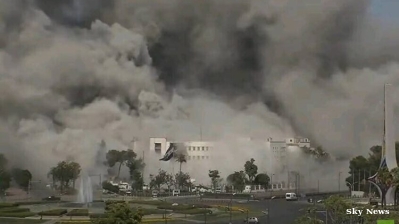The Azerbaijani government has released prominent human rights activist Leyla Yunus from prison but the move is not seen as a sign that the government is planning to lift its repression of any opposition.
Yunus was sentenced to eight-and-a-half years in prison on charges of fraud and tax evasion in August, after she had spent more than a year behind bars. She was released on December 9 on health grounds.
Her fellow activist and husband Arif Yunus was also released in November for health reasons. He was convicted to seven-and-a-half years in prison on similar grounds, although critics alleged that both convictions were politically motivated and based on trumped up charges.
Leyla Yunus is one of the few civil society members in Azerbaijan who worked towards reconciliation with Armenia, Azerbaijan's neighbour, with which Baku is in a state of frozen war over the breakaway region of Nagorno-Karabakh. The Yunuses are facing a separate trial for treason over their links to Armenia. Both spouses suffer from diabetes and other illnesses, and Leyla complained that she was severely beaten by prison guards in detention.
The international community reacted positively to the news of her release. Martin Schultz, president of the European Parliament, called it "wonderful news for all the defenders of human rights in Azerbaijan and worldwide", despite noting that the release was "conditional" upon good behaviour. "The European Parliament reiterates its request for the charges against them to be dropped and their names fully cleared," Schultz said in a statement on December 9.
Meanwhile, another high-profile political prisoner in Azerbaijan, journalist Khadija Ismayilova, marked one year in detention on December 7. The award-winning journalist had investigated the wealth of the ruling family in Azerbaijan and had been subjected to intimidation and harassment prior to her arrest. She was sentenced to seven-and-a-half years in prison in September on charges of libel, tax evasion and illegal business activity in a closed trial.
Developments on December 8, however, suggest that Baku is not ready to mend its human rights record, which has been an object of widespread international criticism. The night before Leyla Yunus was released, Fuad Gahramanly, deputy chairman of the opposition Popular Front (PF), was arrested on charges of "inciting racial and religious hatred with the use and threat of violence", according to PF Chairman Ali Karimly. Karimly denounced the charges, which could land Gahramanly a five-year prison sentence, as politically motivated.
"Gahramanly is a relentless fighter for democracy in Azerbaijan, that's what he is being punished for," Karimly said.
Since the summer of 2014, Baku stepped up its crackdown on independent and opposition voices and has jailed several prominent civil right activists and journalists, while driving others into exile. According to Freedom House, there are more than 80 political prisoners in Azerbaijan. It is unclear why the summer of 2014 marked a more aggressive stance towards internal dissent, but aggression at the border with Armenia also escalated at that time.
Azerbaijani President Ilham Aliyev and his administration have denied accusations of civil right abuses and claimed the accused faced fair trials.
The decline in oil prices in the last 18 months might add an economic dimension to the plight of government critics in Azerbaijan. In late November, a deadly clash between police and residents of a poor village outside of Baku, Nardaran, resulted in seven casualties and 46 arrests, as well as in the village of 8,000 inhabitants being effectively cut off from the world.
The government accuses villagers of religious extremism and possession of weapons and has cut pff utilities - electricity, gas and telephone lines - as well as blocking access ways to the village. Police continues to monitor roads that connect Nardaran to the outside world. Villagers, however, have long been at odds with Baku over poverty and government restrictions on freedom of religion.
Azerbaijan experienced large-scale demonstrations in 2011 echoing Arab Spring protests, but since then authorities have moved to further limit freedom of assembly and speech. Libel lawsuits are common in Azerbaijan, and journalists must comply with draconic laws aimed at regulating their activity. In September, Baku moved to arrest foreign journalists active in its territory for the first time for not complying with local registration regulations.
News
_and_Abdulla_Orusov_(right)_160725_1752697590.jpg)
Trio of Turkmen opposition activists face deportation from Turkey as Ankara “indulges” Ashgabat
Erdogan builds Turkic ties, loses patience with Turkmen critics.

Hungarian farmers dump manure at EU headquarters in protest at planned cuts in CAP funds
Hungarian farmers dumped piles of manure in front of the EU’s headquarters in central Budapest in protest at the European Commission’s plans to overhaul the Common Agricultural Policy from 2028, leading to cuts in agricultural subsidies.

US YouTube star IShowSpeed stuns Lithuania in €30,000 visit, sniffs an official’s armpit
Internet personality Darren Jason Watkins, American – better known as IShowSpeed – arrived in Lithuania on July 15, and was welcomed at the airport by Minister of the Economy Lukas Savickas,

Brazil seeks more time to negotiate as Trump tariffs threaten significant economic damage
Brazil will pursue a rapid reversal of Washington's 50% tariff announcement while remaining open to requesting additional negotiation time, according to Vice President Geraldo Alckmin.




_and_Russian_Dep_Pm_Alexey_Overchuk_140725_1752524933.jpg)